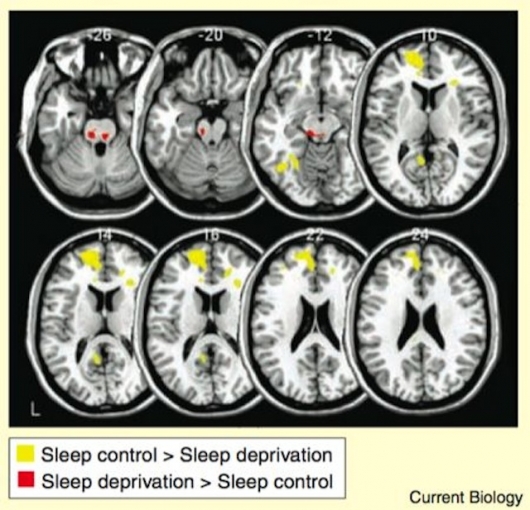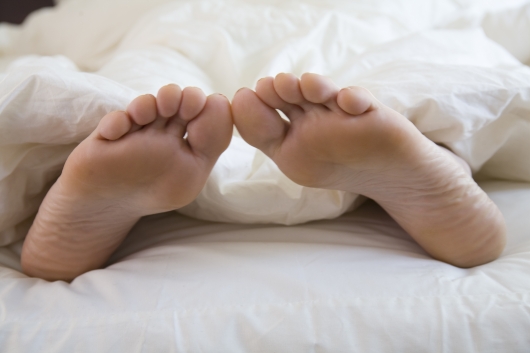How much we need sleep to be productive?
Feeling overwhelmed after sleep? You’re not sleep! That’s how it is.

During the life of each of us sleeps an average of 24 years. However, we still have not answered many of the questions concerning sleep and its quantity. In this article Leo Widrich will talk about what we learned the most important research in the field of sleep. Of course, you will be able to use this knowledge to develop their own productive rhythm of the day.
One of the biggest challenges in my research is that sleep is a overly discussed topic. We think we know everything about him: how much time we need for sleep, how it affects us and what happens while we sleep. As soon as I took a step back and really thought about where all come from our knowledge about sleep, I realized that almost all of them are based on hearsay or the advice received from mom when we were in elementary school.
Dispelling the myth of eight hours of sleep
We all know the answer to the question “how much sleep do we need”? The most frequent answer (which I do many times given) sounds like this: “Oh, it’s just. Need to sleep 8-9 hours a night, that’s for sure”.
It turns out that this information might not be entirely true.
One of the most famous sleep researchers, Daniel Kripke, said that the rule 8 hours sleep is no scientific justification. In its latest study, scientist found that “people who sleep from 6.5 to 7.5 hours a night live longer, happier and productive life than others.”
An even more interesting discovery is that a long sleep can negatively affect your health.

Personally, I sleep exactly 8 hours a day, so this statement has caused me great interest. I began to experiment, reducing the duration of their sleep to 7.5 hours to see if anything comes of it.
Of course, the idea of a “universal sleep time for all” many people think suspicious. It writes about in his book Jim horn is one of the most renowned experts in the field of sleep study in Europe:
“It’s like, what to say, though all men should wear shoes size 38, or their growth should not exceed 1, 78 cm.”
It seems that the best way to look for their own optimal sleep time within the value that is mentioned by Kripke. That is what I am currently working.
The danger of lack of sleep: what happens to the brain when we sleep?
This is the most interesting part related to the mechanism of sleep. Have you ever met a person who slept only 4 hours, but it looks the same focused, and refreshed as you are after a 7.5 hour sleep?
The secret here is this: a person who is severely lacking sleep, in fact as attentive and awake as you are. Here’s what transpired in the recent study: people deprived of good sleep, actually, if desired, during the execution of certain exercises may show the same results as the good people slept.
Quite strange, isn’t it?
So what’s the deal?

The problem is different. Regardless of the duration of sleep, all of us from time to time lose concentration. And it is here that man, deprived of sleep, falls into a kind of “trap”. If we start to lose concentration, but at the same time get enough sleep, our brain can compensate for this decline by improving attention (in the figure, we see how yellow the activated areas of the brain that and return us readiness). But if we are sleep deprived, our brain can’t move quickly.
The main conclusion is that the human brain, deprived of sleep, sometimes it works fine, but occasionally suffers from a kind of “power failure”.

So says Clifford Saper from Harvard. In the above image, everything is clearly visible. Yellow plots show how the activated brain areas in people with a sufficient amount of sleep in terms of loss of concentration and deterioration of attention. So the brain adapts to the execution of the task. In humans, sleep-deprived, this area (the amygdala) will not exhibit virtually no activity in an attempt to regain concentration.
So it could indeed be a kind of trap. People bragging about how sleeping only 4 hours and very good at their job, in General, do not lie. The only problem is that they do not have the resources to re-focus on the job in the event of a loss of concentration. What’s worse, sleep-deprived people don’t notice the reduced performance.
These workers may not know about your condition. According to Sapper, “the periods of normal state of health can give a false sense of competence and security, although, in fact, malfunctions of the brain can have not very pleasant consequences.”
Tune to a good night’s sleep
Lack of sleep is the problem. But let’s talk about nice: what we can do to optimize your sleep schedule and become superproductive employee?
The Internet is full of information on techniques that can be applied to optimize sleep schedule. After analyzing the data the three most respected sources, I have identified three main methods that will allow better sleep and more productive:
A short break for sleep – how it works
Over the past 2 years, since I started to work on the project Buffer, I spent in short NAPs at least 20 minutes a day. One of my favorite writers and authors New York Times Michael Hyatt for many years doing the same thing. He published his ideas in this wonderful article about short breaks for sleep.
As noted by Michael, one of the main advantages of such breaks is that you can restore your concentration in just a few minutes of short sleep.

I personally noticed that my performance drops by about 3 o’clock. It was at this time I’m doing a little break to sleep and it helps me quickly and efficiently to regain absolute performance.
Michael sent me an interesting video which says that one of the key advantages of this dream – the opportunity to get rid of fatigue. Although this may seem obvious to the outrageous, but getting rid of fatigue can make you much happier. See for yourself.
To accustom themselves to this dream is often extremely difficult. Here are three basic ways that, in my opinion, unable to help you with this:
One of the most important points is to inform others about what you take a break to sleep every day. Try to enlist the support of colleagues and managers – this will give you extra attitude for to make NAPs a daily habit.
It is very important to monitor the duration of sleep. In fact, in our video, the phrase “break to the dream on me has no effect” often sounds just because its author is asleep for too long. Sleep should not last more than 30 minutes. For me personally, 20 minutes is the best option.
– The last tip that I think is most important is to make sleep a habit. Ensure that sleep has been a constant (daily), and that it started about the same time (3 hours a day for many seems to be a very good time).
The ritual of sleep — how it works and why you need it

How to learn fast and hard to get to sleep? It’s very simple: design a special ritual that will prepare you for a wonderful night sleep. Unlike habits, rituals can be much more convincing in terms of motivation.
In his excellent article on the rituals of sleep Joel Gascoigne writes: “Habits are often perceived as something we have to force ourselves to do while rituals are actions to which we reach ourselves.” Creating your own ritual of sleep, it is important to make the last session was completely freed your mind from upcoming and future challenges. Here are a few options that will help you “disconnect” your mind:
– 20 minute walk on a certain route at a certain time. This is a great way to clear your head and prepare for bed. If you want to develop a craving for walks, you can try exercises Coelho.
– Another effective way to read fiction. In contrast to the popular science genre, these books allow you to completely escape and immerse yourself into another world and way of thinking, and then you’ll be ready for a great sleep.
The last trick that worked perfectly in my example, is to denote the precise time of awakening, and tie it to some event that will happen later. If you just set an alarm, say for 7:30, and then disable it and go back to sleep, it won’t work. Put the alarm clock, but pre-plan future events, and tie them to a specific time. For me this event was the Breakfast – from 7:40. It could also be charging at 7:45. Joel, for example, runs to the gym exactly 5 minutes after waking up. All these things can help you to find the strength to cheerfully get out of bed.
Fatigue – the key to good sleep

A key part of the book Laura, Jim and Tony Schwartz called “power of full engagement” is dedicated to the realization that to obtain the maximum quality of sleep you should be completely exhausted both physically and mentally.
Mentally and physically challenging task can help you to experience deep sleep which will restore your body in all respects.
The last fact: women need more sleep than men

Here’s the last one curious fact: women on average need a bit more time to sleep than men – about 20 minutes, but this figure can vary up or down. Why? According to horn, the fact is that women’s brains are wired differently than men: they are more complex and therefore they need more time to rest.
